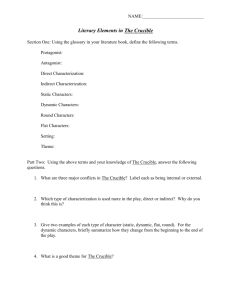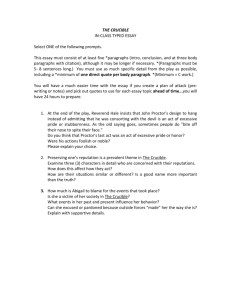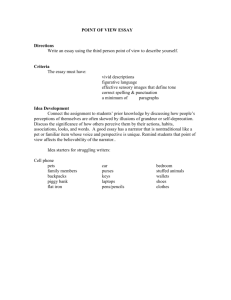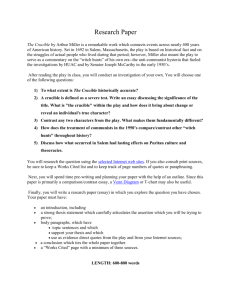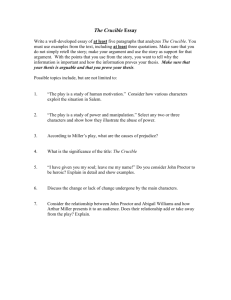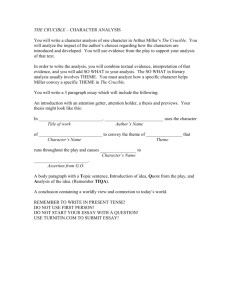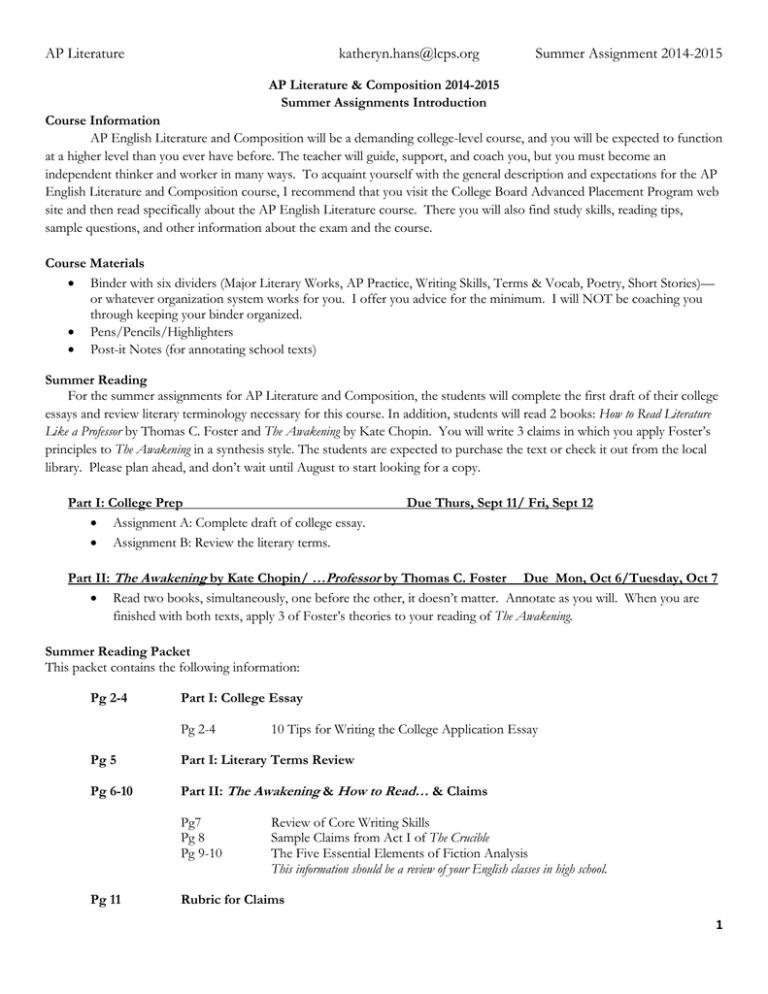
AP Literature
katheryn.hans@lcps.org
Summer Assignment 2014-2015
AP Literature & Composition 2014-2015
Summer Assignments Introduction
Course Information
AP English Literature and Composition will be a demanding college-level course, and you will be expected to function
at a higher level than you ever have before. The teacher will guide, support, and coach you, but you must become an
independent thinker and worker in many ways. To acquaint yourself with the general description and expectations for the AP
English Literature and Composition course, I recommend that you visit the College Board Advanced Placement Program web
site and then read specifically about the AP English Literature course. There you will also find study skills, reading tips,
sample questions, and other information about the exam and the course.
Course Materials
Binder with six dividers (Major Literary Works, AP Practice, Writing Skills, Terms & Vocab, Poetry, Short Stories)—
or whatever organization system works for you. I offer you advice for the minimum. I will NOT be coaching you
through keeping your binder organized.
Pens/Pencils/Highlighters
Post-it Notes (for annotating school texts)
Summer Reading
For the summer assignments for AP Literature and Composition, the students will complete the first draft of their college
essays and review literary terminology necessary for this course. In addition, students will read 2 books: How to Read Literature
Like a Professor by Thomas C. Foster and The Awakening by Kate Chopin. You will write 3 claims in which you apply Foster’s
principles to The Awakening in a synthesis style. The students are expected to purchase the text or check it out from the local
library. Please plan ahead, and don’t wait until August to start looking for a copy.
Part I: College Prep
Assignment A: Complete draft of college essay.
Assignment B: Review the literary terms.
Due Thurs, Sept 11/ Fri, Sept 12
Part II: The Awakening by Kate Chopin/ …Professor by Thomas C. Foster Due Mon, Oct 6/Tuesday, Oct 7
Read two books, simultaneously, one before the other, it doesn’t matter. Annotate as you will. When you are
finished with both texts, apply 3 of Foster’s theories to your reading of The Awakening.
Summer Reading Packet
This packet contains the following information:
Pg 2-4
Part I: College Essay
Pg 2-4
10 Tips for Writing the College Application Essay
Pg 5
Part I: Literary Terms Review
Pg 6-10
Part II: The Awakening & How to Read… & Claims
Pg7
Pg 8
Pg 9-10
Pg 11
Review of Core Writing Skills
Sample Claims from Act I of The Crucible
The Five Essential Elements of Fiction Analysis
This information should be a review of your English classes in high school.
Rubric for Claims
1
AP Literature
Part I: College Essay
katheryn.hans@lcps.org
Summer Assignment 2014-2015
Due Thurs, Sept 11/ Fri, Sept 12
Assignment A: Complete draft of college essay.
Before you start, here are:
10 Tips for Writing the College Application Essay by JEREMY S. HYMAN, LYNN F. JACOBS
No subject is more fraught with anxiety for the high school senior than the essay on the college application.
Whether it is as bizarre as the University of Chicago's "How do you feel about Wednesday?"; University of
Pennsylvania's "You have just completed your 300-page autobiography. Please submit page 217."; or Tufts
University's "Are We Alone?"—or whether it is a more mundane question about a formative experience you've had
in your life, or about some controversial social or political issue, students tremble at the very thought of writing the
essay and being judged on it.
We wondered what tips could be offered to ease the pain. For advice, we turned to visiting blogger Jonathan Reider,
director of college counseling at San Francisco University High School, who before that was the senior associate
director of admissions (and humanities instructor) at Stanford University. He should know; he's been on both sides
of the high school/college door. Here are his 10 best tips:
1. Be concise. Even though the Common Application main essay has only a suggested minimum of 250 words, and
no upper limit, every admissions officer has a big stack to read every day; he or she expects to spend only a couple
of minutes on the essay. If you go over 700 words, you are straining their patience, which no one should want to
do.
2. Be honest. Don't embellish your achievements, titles, and offices. It's just fine to be the copy editor of the
newspaper or the treasurer of the Green Club, instead of the president. Not everyone has to be the star at
everything. You will feel better if you don't strain to inflate yourself.
3. Be an individual. In writing the essay, ask yourself, "How can I distinguish myself from those thousands of
others applying to College X whom I don't know—and even the ones I do know?" It's not in your activities or
interests. If you're going straight from high school to college, you're just a teenager, doing teenage things. It is your
mind and how it works that are distinctive. How do you think? Sure, that's hard to explain, but that's the key to the
whole exercise.
4. Be coherent. Obviously, you don't want to babble, but I mean write about just one subject at a time. Don't try to
cover everything in an essay. Doing so can make you sound busy, but at the same time, scattered and superficial.
The whole application is a series of snapshots of what you do. It is inevitably incomplete. The colleges expect this.
Go along with them.
5. Be accurate. I don't mean just use spell check (that goes without saying). Attend to the other mechanics of good
writing, including conventional punctuation in the use of commas, semi-colons, etc. If you are writing about
Dickens, don't say he wrote Wuthering Heights. If you write about Nietzsche, spell his name right.
2
AP Literature
katheryn.hans@lcps.org
Summer Assignment 2014-2015
6. Be vivid. A good essay is often compared to a story: In many cases it's an anecdote of an important moment.
Provide some details to help the reader see the setting. Use the names (or invent them) for the other people in the
story, including your brother, teacher, or coach. This makes it all more human and humane. It also shows the reader
that you are thinking about his or her appreciation of your writing, which is something you'll surely want to do.
7. Be likable. Colleges see themselves as communities, where people have to get along with others, in dorms,
classes, etc. Are you someone they would like to have dinner with, hang out with, have in a discussion section?
Think, "How can I communicate this without just standing up and saying it, which is corny." Subtlety is good.
8. Be cautious in your use of humor. You never know how someone you don't know is going to respond to you,
especially if you offer something humorous. Humor is always in the eye of the beholder. Be funny only if you think
you have to. Then think again.
9. Be controversial (if you can). So many kids write bland essays that don't take a stand on anything. It is fine to
write about politics, religion, something serious, as long as you are balanced and thoughtful. Don't pretend you have
the final truth. And don't just get up on your soapbox and spout off on a sensitive subject; instead, give reasons and
arguments for your view and consider other perspectives (if appropriate). Colleges are places for the discussion of
ideas, and admissions officers look for diversity of mind.
10. Be smart. Colleges are intellectual places, a fact they almost always keep a secret when they talk about their
dorms, climbing walls, and how many sports you can play. It is helpful to show your intellectual vitality. What turns
your mind on? This is not the same thing as declaring an intended major; what matters is why that subject interests
you.
© Copyright 2010 Professors' Guide LLC. All rights reserved.
Step #1: Select the Topic
Select a topic from the list below or you may use a topic from a specific college application.
Personal Essay Please write an essay (500-750 words) on a topic of your choice or on one of the
options listed below, and attach it to your application before submission. Please indicate your topic
by checking the appropriate box. This personal essay helps us become acquainted with you as a
person and student, apart from courses, grades, test scores, and other objective data. It will also
demonstrate your ability to organize your thoughts and express yourself.
(1) Evaluate a significant experience, achievement, risk you have taken, or ethical dilemma
you have faced and its impact on you.
(2) Discuss some issue of personal, local, national, or international concern and its
importance to you.
(3) Indicate a person who has had a significant influence on you, and describe that influence.
(4) Describe a character in fiction, a historical figure, or a creative work (as in art, music,
science, etc.) that has had an influence on you, and explain that influence.
(5) A range of academic interests, personal perspectives, and life experiences adds much to
the educational mix. Given your personal background, describe an experience that illustrates
what you would bring to the diversity in a college community or an encounter that
demonstrated the importance of diversity to you.
or
State the prompt for a college application.
3
AP Literature
katheryn.hans@lcps.org
Summer Assignment 2014-2015
Step #2: Decide on Focus
1) What is the central idea or event or idea you will use at the core of your essay?
2) What will be the focus for:
a) Introduction
b) Body
c) Conclusion
Step #3: Complete the Draft
Complete a draft of your college essay in MLA format.
Your Name
Teacher Name
AP Literature #
# Month Year
Type the prompt here.
Metaphor Title
Xxxxxxxxxxxxxxxxxxxxxxxxxxxxxxxxxxxxxxxxxxxxxxxxxxxxxxxxxxxxxxxxxxxxxx
xxxxxxxxxxxxxxxxxxxxxxxxxxxxxxxxxxxxxxxxxxxxxxxxxxxxxxxxxxxxxxxxxxxxxxxxxxxxxx
Xxxxxxxxxxxxxxxxxxxxxxxxxxxxxxxxxxxxxxxxxxxxxxxxxxxxxxxxxxxxxxxxxxxxxxxxxxxxxx
xxxxxxxxxxxxxxxxxxxxxxxxxxxxxxxxx.
Word Count: ###
The draft of the college essay is due
at the beginning of class on Thurs, Sept 11/ Fri, Sept 12.
Students will be sharing their writing.
4
AP Literature
katheryn.hans@lcps.org
Part I: Literary Analysis Review
Summer Assignment 2014-2015
Due Thurs, Sept 11/ Fri, Sept 12
This is not a conclusive list of literary terms for AP Literature; students should be familiar with these terms at the
beginning of the year. Please review the terms and ensure that you know each definition and could identify an
example. Terms with * by them are referenced on “The Five Essential Elements of Fiction Analysis.” THERE
WILL BE A QUIZ!!!
Narrative
Point of View*
First person narration*
Third-person narration
o Omniscient narration*
o Limited omniscient narration*
o Free indirect discourse
Objective Narrator*
Unreliable narrator
Stream-of-consciousness narration*
Character*
Protagonist*
o Hero/Heroine*
Antagonist*
Stock character*
Dynamic character*
Flat character*
Round Character*
Foil*
Confidant/Confidante*
Mentor*
Characterization*
Direct characterization*
Indirect characterization*
Setting*
Plot
Conflict*
Rising action
Climax
Falling action
Resolution
Elements of Style
Figures of Speech
Alliteration
Apostrophe
Assonance
Cacophony
Cliché
Hyperbole
Metaphor
o Mixed Metaphor
Metonymy
Onomatopoeia
Oxymoron
Paradox
Personification
Rhetorical Question
Simile
Synaesthesia
Synecdoche
Literary Techniques
Antithesis
Allusion
Foreshadowing
Irony
o Verbal irony
o Situational irony
o Dramatic Irony
Thematic Meaning
Imagery
Motif
Symbol
Theme*
Thesis
Tone
5
AP Literature
katheryn.hans@lcps.org
Part II: The Awakening and How to Read…
Summer Assignment 2014-2015
Due Mon, Oct 6/Tues, Oct 7
Read two books, simultaneously, one before the other, it doesn’t matter. Annotate as you will. When you are
finished with both texts, apply 3 of Foster’s theories to your reading of The Awakening.
Claim Paper Guidelines
Core Writing Skills:
Making an argumentative claim
Supporting your position with textual evidence
Integrating and citing evidence
Taking a risk in your analysis
Assessment:
Each response paper will be worth 10 points, and will be assessed using the standard 4-point rubric.
Formatting Requirements:
Each response paper should be one page, typed and double-spaced
Give each paper a standard MLA heading
Title each paper “The Awakening: [Foster’s chapter title]” (fill the brackets in with the appropriately title)
Label your “claim,” then analyze that claim in a well-developed paragraph
Your response cannot exceed one page in length, so make sure your analysis is concise and focused—NO
FLUFF
Content Requirements:
Claim: The claim is a statement of argument that you will prove with evidence and analysis. Your claim should
be argumentative, focused, and specific. Your claim in each response paper must address the assigned element
of literary analysis.
Analysis: Support your claim with detailed analysis. Primarily, you’ll use textual evidence as support, and you
must provide commentary on how the evidence proves your claim. You should include evidence from both
texts.
The most important content requirement for these response papers: TAKE A RISK. Push yourself to argue something new
and expand your analysis skills.
Sample:
Joe Smith
Teacher Name
AP Literature
# Month 2012
The Awakening: [Foster’s Chapter Title]
Claim: [Argumentative, focused, and specific]
Detailed Analysis: [Cannot exceed one page; minimum of two quotes, integrated and cited properly]
6
AP Literature
katheryn.hans@lcps.org
Summer Assignment 2014-2015
Before you start, here is a review in
Core Writing Skills
Making an argumentative claim
Imagine having a heated debate with a classmate about a text. Your claim should be argumentative, focused, and
specific. You can make a claim about a character, a symbol, a motif, an emerging theme, an element of the plot
that that you’d like to explore more in-depth…something that bothers you, frustrates you, angers you, etc. as
you’re reading.
In order to strengthen your claim, imagine someone challenging you and asking, “SO WHAT?” This will help
you narrow and focus your argument.
Sample progression of an argument from weak to strong by answering the “so what?” question:
“Abigail pressures the girls into going along with her story by threatening them.” WEAK
“So what?”
“So, Miller seems to be arguing something about the power of peer pressure.”
“So what?”
“Well, it seems significant that all the accusers are young girls. Maybe Miller is really making a social argument about
the manipulative powers of groups of women.”
“So what?”
“So, The Crucible is really a critique of female gender identity.” STRONG
Supporting your position with textual evidence
For your Things Fall Apart responses, you’re required to have at least two direct quotes from the text. Always
choose your evidence carefully.
Integrating and citing evidence
• NO FLOATING QUOTATIONS. Quotes are “floating” if the writer has just thrown them into the
paper without integrating them into his or her own analysis.
• Use the formula below when integrating quotations:
Introduce, “Quote” (cite). Analyze
*Note capitalization AND punctuation
Take a risk in your analysis
Don’t play it safe and argue something simplistic and obvious in the text.
Push yourself to argue something new and expand your analysis skills.
Be creative and think outside the box.
7
AP Literature
katheryn.hans@lcps.org
Summer Assignment 2014-2015
Sample Claims: Crucible Response Paper Act #1
Score of 4
Score of 3
Score of 2
Score of 1
1. “The eruption of mass hysteria in The Crucible
is directly related to the Puritans’ inability to
intertwine reason and religion/ superstition.”
2. “The opening of the play The Crucible by
Arthur Miller follows the common
misconception that all teenagers are attracted to
disobedience.”
3. “Religion is a manipulative tool used for
personal gain.”
4. “Reverend Parris’s character is used by Arthur
Miller as a catalyst to demonstrate the hypocrisy
of religious authority.”
5. “Betty was never physically possessed, but
was scared and seeking a way of escape to
ease the lasting effect of her mother’s
death.”
6. “The Crucible demonstrates the selfish
tendencies of human behavior, creating a
paradox and a sense of hypocrisy even in the
face of God.”
7. “The Crucible is an explanation of why
ignorance is the key to survival.”
8. “Goody Ann finds pleasure seeing others in
pain, because she yearns for everyone to feel the
same pain she did having lost seven of her
children.”
9. “The Crucible is an unjust assessment of the
basis for American democracy.”
10. “The Crucible portrays the pattern of
conservative parents leading to rebellious
children.”
1. “The Crucible is really a play
concerning the effect of
communism.”
2. “In The Crucible, Miller is
trying to show Abigail’s inner
evil.”
3. “Arthur Miller’s The Crucible
is a commentary on human
behavior.”
4. “Betty Parris is
pretending to be asleep
because she’s scared.”
5. “In Act One of The Crucible,
Abigail shows multiple
personalities and morals that
change depending on who she
is around at a given time.”
1. “The accusations against Tituba in
this play are supposed to represent the
struggles and obstacles African slaves
had to go through, showing the cruelty
of the owners of these slaves.”
2. “The Crucible is a play about a group
of mischievous girls who gradually take
possession of Salem.”
3. “The girls in The Crucible are all
spoiled, impure, immoral liars that
blame all their actions on the Devil
and witchcraft.”
4. “Although Abigail Williams is a
sweet, nice girl on the outside, she is
really quite manipulative and evil.”
5. “Betty was awake the whole time
during the play.”
1. “Reverend Parris believes
that there is a ‘faction’ that
is out to get him.”
2. “The Crucible takes place
between 1692 and 1693.”
3. “The night before the
opening of the play, a bunch
of girls were dancing in the
woods.”
4. “Arthur Miller’s The
Crucible takes place in the
Puritan colony in
Massachusetts.”
5. “One of the ‘afflicted
girls’ is Betty Parris, the
minister of Salem’s
daughter.”
8
AP Literature
katheryn.hans@lcps.org
Summer Assignment 2014-2015
Before you start,
Review The Five Essential Elements of Fiction Analysis
One: A character is a person presented in a fictional work, one fitting a type and fulfilling a function.
Types of characters: A static character does not change throughout the work, and the reader’s knowledge of
that character does not grow, whereas a dynamic character undergoes some kind of change because of the
action in the plot. A flat character embodies one or two qualities, ideas, or traits that can be readily described
in a brief summary. These are not psychologically complex characters and therefore are readily accessible to
readers. Some flat characters are recognized as stock characters; they embody stereotypes such as the "dumb
blonde" or the "mean stepfather." They become types rather than individuals. Round characters are more
complex than flat or stock characters, and often display the inconsistencies and internal conflicts found in
most real people. They are more fully developed, and therefore are harder to summarize.
Functions of characters: A hero or heroine, often called the protagonist, is the central character who engages the
reader’s interest and empathy. The antagonist is the character, force, or collection of forces that stands
directly opposed to the protagonist and gives rise to the conflict of the story. A foil is a character who
through contrast underscores the distinctive characteristics of another. Usually a minor character serves as a
foil for a major character. A confidant/confidante is a character who is not integral to the action but who
receives the intimate thoughts of the protagonist without the use of an omniscient narrator. A mentor is a
character who serves as a guide for the protagonist.
Two: The point of view is the perspective from which the action of a novel is presented, whether the action is presented by one character
or from different vantage points over the course of the novel.
These are common narrative positions:
The omniscient narrator is a third-person narrator who sees, like God, into each character’s mind and
understands all the action going on.
The limited omniscient narrator is a third-person narrator who generally reports only what one character (often
the protagonist) sees and who only reports the thoughts of that one privileged character.
The objective, or camera-eye, narrator is a third-person narrator who only reports what would be visible to a
camera. The objective narrator does not know what the character is thinking unless the character speaks of
it.
The first-person narrator, who is a major or minor character in the story, tells the tale from his or her point of
view. When the first person narrator is insane, a liar, very young, or for some reason not entirely credible,
the narrator is unreliable. Some first-person narratives include multiple narrators.
The stream of consciousness technique is like first-person narration, but instead of the character telling the story,
the author places the reader inside the main character’s head and makes the reader privy to all of the
character’s thoughts as they scroll through his or her consciousness.
Characterization, an effect of point of view and narrative perspective, is the process by which a writer reveals the
personality of a character, making that character seem real to the reader. Authors have two major methods of
presenting characters: telling (direct characterization) and showing (indirect characterization).
In direct characterization, the author intervenes to describe and sometimes evaluate the character for the reader.
For example, the narrator may tell the reader directly what the character’s personality is like: humble,
ambitious, vain, gullible, etc.
Indirect characterization allows the author to present a character talking and acting and lets the reader infer
what kind of person the character is. There are five different ways that a writer may provide indirect
characterization:
9
AP Literature
katheryn.hans@lcps.org
Summer Assignment 2014-2015
o by describing how the character looks and dresses,
o by allowing the reader to hear the character speak,
o by revealing the character’s private thoughts and feelings,
o by portraying the character’s effect on other individuals—showing how other characters feel or
behave toward the character, and
o by presenting the character’s actions.
Characters can be convincing whether they are presented by showing or by telling, as long as their actions are
motivated. Motivated action by the characters occurs when the reader or audience is offered reasons for how
the characters behave, what they say, and the decisions they make. Plausible action is action by a character in a
story that seems reasonable, given the motivations presented.
Three: The setting is the physical and social context in which the action of a story occurs. The major elements of setting are the time,
the place, and the social environment that frames the characters. Setting can be used to evoke a mood or atmosphere that will prepare the
reader for what is to come. Specific elements of the setting include:
the geographical location (its topography, scenery, and physical arrangements),
the occupations and daily manner of living of the characters,
the time period in which the action takes place (epoch in history or season of the year), and
the general environment of the characters (social, religious, cultural, moral, and emotional conditions and
attitudes).
Four: The conflict in a work of fiction is the struggle within the plot between opposing forces—the issue to be resolved in the story. The
protagonist engages in the conflict with the antagonist, which may take the form of a character, society, nature, or an aspect of the
protagonist’s personality. Thus, conflict may be external, a struggle against some outside force, another character, society as a whole, or
some natural force; or internal, a conflict between forces or emotions within one character.
Five: Theme is the central meaning or dominant idea in a literary work. A theme provides a unifying point around which the plot,
characters, setting, point of view, symbols, and other elements of a work are organized. It is important not to mistake the theme for the
topic of the work; the theme expresses an opinion about an abstract concept (i.e. freedom, jealousy, guilt, unrequited love, self-pity).
Theme should be written in a complex statement:
The [genre] [title] by [author] is about [topic/abstract concept] and reveals that [opinion].
10
AP Literature
katheryn.hans@lcps.org
Summer Assignment 2014-2015
Name _____________________________ Summer Assignment Part II: The Awakening/ Apply Foster’s Principles
Response Papers
Claim 1
Rubric
4 (10)
Argumentative thesis that shows significant risk
Detailed and insightful analysis
Evidence is chosen thoughtfully and integrated smoothly
Effective organization and focus, with smooth transitions
Unique and consistent writer’s voice
No more than a few mechanical flaws that do not reduce the
impact of the paper
3.5 (9)
Contains characteristics from both categories 4 and 3
____/10
Claim 2
3 (8)
Clear thesis that makes a claim, but lacks risk
Effective analysis, but lacks some detail and insight
Effective use of evidence; mostly integrated smoothly
Adequate organization and focus; some transitions
Emerging, if inconsistent, writer’s voice
Several mechanical flaws that show some lack of attention to
detail
2.5 (7)
Contains characteristics from both categories 3 and 2
____/10
Claim 3
2 (6)
Thesis is too vague and simplistic/formulaic; no risk
Some analysis, but mostly summary
Weak evidence; choppy quote integration
Loss of focus in organization; missing transitions
Generally absent writer’s voice
Mechanical flaws that show definite lack of attention to detail
1(5)
Thesis is difficult to find
Lack of analysis; all summary
Lack of evidence; missing quotes and/or not integrated
Weak organization; no transitions
No writer’s voice
Mechanical flaws that obscure meaning
____/10
_____/30 Total Score for Summer Assignment Part II
11

